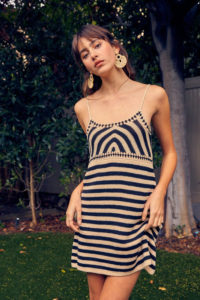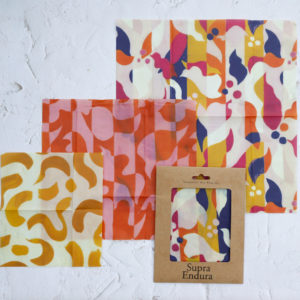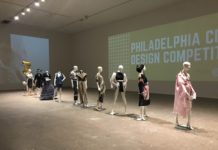
Low-rise jeans are making a comeback, much to the near-unanimous chagrin of Jewish fashion experts.
The return of the infamous pants, deemed “unflattering” and “outdated,” is an omen of the return of a whole host of clothing styles of the late 1990s and early aughts — for better or for worse.
“We’re seeing the ’90s kind of in full-force, moving into the early 2000s a little bit,” said Rachel Mednick, adjunct professor and fashion educator at Drexel University.
The delight in early ’00s pop culture was made clear on the national level when 103.4 million viewers tuned into the Feb. 13 Super Bowl halftime show, where Snoop Dogg and Dr. Dre began and ended the concert with a rendition of their 2001 collaboration “The Next Episode.” Other ’90s and ’00s superstars — 50 Cent, Mary J. Blige and Eminem — helped draw in an audience 7% larger than last year’s performance, according to The New York Times.
Mednick sees college students walking into her classroom wearing crop tops and showing midriffs or donning leggings and oversized T-shirts, paying homage to the turn of the millenium.
“That was ‘the thing’ when I was growing up,” Mednick, 34, said.
The styles are colorful, a little suggestive, but comfortable, making them appealing to not just younger audiences, but also to those transitioning out of their pandemic sweatsuits, Fashion Statement Boutique owner Marissa Gelman said.
“People are ready to go out there, being comfortable, but they also want to express themselves — colors and different types of fabrics,” Gelman said.
Though an outspoken opponent of low-rise jeans, Gelman is incorporating ’90s inspirations into her upcoming designs, adding “sophistication” to the styles with which she grew up.
She’s leaning into the long, flowy skirts popular 25-30 years ago, as well as long crochet dresses, hoping to evoke images of “Friends”-era Jennifer Aniston. Miniskirts and spaghetti straps of the ’00s, however, will not make an appearance.
Young designers now in their 30s don’t have the same desire to bring back the styles of their youth. Instead, the Generation Z “Zoomers,” now teenagers, are embracing the looks. Video streaming social media platform TikTok, which has skyrocketed influencers to fame, has helped popularize these looks, Mednick said.
But young people aren’t the only ones inspired by throwback fashion. Plenty of people tend to look back on past eras for inspiration.
“I think back to even my grandmother and what she wore growing up, and I think that was such a beautiful era, and things were handmade, and it was so different,” Mednick said. “She looks back on that and appreciates that and says, ‘Why don’t we do this anymore? Things are so much better made; it was better quality.’”
Mednick and Gelman both cited the ’60s and ’70s as inspiration for their personal fashion: “funky, free-flowing” skirts with “flower power” patterns and bright colors.

 Gabrielle Mandel, creator of art and home goods collection Supra Endura, is launching a collection of abstract-patterned beeswax wraps and dishcloths inspired by the time period, with the additional influences of popart, Henri Matisse’s impressionism and designer Roy Halston Frowick’s affinity for disco.
Gabrielle Mandel, creator of art and home goods collection Supra Endura, is launching a collection of abstract-patterned beeswax wraps and dishcloths inspired by the time period, with the additional influences of popart, Henri Matisse’s impressionism and designer Roy Halston Frowick’s affinity for disco.
“People are turning more towards this fun optimism and probably a little bit of hedonism that also kind of started in the ’70s,” Mandel said.
COVID has made people itch for levity and bright colors in their style, Mandel said. Mednick agreed, arguing that the ’70s were a simpler time, before social media and the pandemic made life feel complicated.
But there is a tendency to add rose-tinted lenses to nostalgia-inspired looks as well.
Mandel, also in her 30s, grew up in the ’90s, never seeing the looks she felt inspired by in person.
“I wasn’t around for the ’70s music and wasn’t really understanding things for most of the ’80s, as a 3-year-old,” she said.
Though many people are drawing on the laid-back reputation and styles of the ’60s and ’70s, few have actually lived through the time period and, therefore, have a reductive perception of that era.
“There’s both an overgeneralization and also not really a deep understanding of what actually was happening,” Mandel said. “Obviously, there was a lot of turmoil and a lot of big changes in the ’60s, and it’s hard to really understand what the mood of those times were.”
As the next generation takes an interest in the turn of the millennium, experts are wondering if this cycle has the potential to continue. Ten years from now, will kids be wearing clothes inspired by the 2010s?
Mednick has reservations. So much clothing from the ’10s was also inspired by past decades; it’s hard to tell what’s original at times.
“We’re kind of stuck at this point,” she said. “I don’t know how much newness we’re really seeing.”
[email protected]; 215-832-0741






